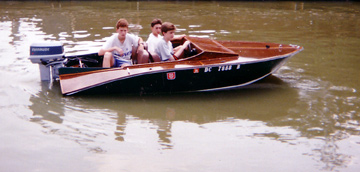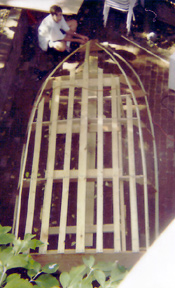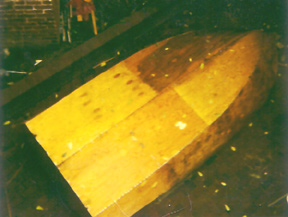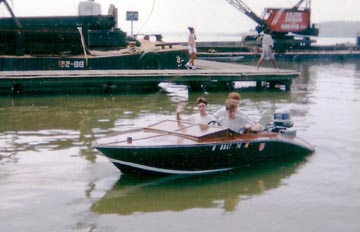 The summer I was 11, Dad’s dream came true. I got up off the couch to build a speedboat …
The summer I was 11, Dad’s dream came true. I got up off the couch to build a speedboat …
by Jonathon Wye
“Do you have any plans for the day?” Dad asked.
“Probably get some subs and watch Gilligan’s Island,” I said. I was Jonathon Wye, 11-year-old occupant of a bowl haircut and all the poor fashion sense that came with it.
Dad would give a sad grin, laugh and say, “Well, that certainly is a plan.”
Oh No, Not the Childhood Stories
“Did I ever tell you kids the story of the time I put your Aunt Sara in the sinking boat?”
“Yes, Dad.”
“What about the cats? Did I tell you about the cats?”
But our dog Cindy was too big to torment with Scotch-taped feet on waxed floors, a fond memory Dad shared with his childhood cats. And we had no pond in the backyard to test the buoyancy of scrap-wood dinghies, a memory dad shared with his younger sister, who he persuaded to test the seaworthiness of his first boat, a plywood box caulked with mud.
“Have you given any thought as to what you want to do this summer? Any adventures planned? Anywhere you want to go?”
“I can’t really think of anything,” I said, trying to catch glimpses of the TV screen.
“I don’t mean for today or tomorrow, but you have a whole big summer ahead of you. Give it some thought.”
I couldn’t think of anything.
A Great Leader
Dad could. Dads always can. At the bottom of the ethereal contract, which all dads sign, there is a consolatory note. It says something like, Hey bub, don’t worry. Your kid’s gonna think you know everything even if ya only got two cents to pay for a penny.
It’s true. To a kid, anyone who knows how to drive and can smile after drinking coffee must be all wise.
“Now, I’ve talked to your mother about this …” he said. Which is how a kid knows he is about to be told something very important. “… and she has agreed to let you and your friends use the backyard to build a speedboat.
“But you must keep the yard in impeccable shape.” His pointing finger was drawn, the right side of his face in a scrutinizing twitch. “Impeccable!”
I imagined a scrap-wood boat with mud in the seams. Out crept a courtesy smile. Please don’t misunderstand. I was in awe, but I imagined myself in a sinking dinghy headed to the bottom of a dark pond. It’s hard for kids to hide their emotions, but Dad could see past them.
“You probably think I’m crazy, but I’ve researched this,” he said. “You and your mother think I’m off my rocker, but, by golly, I’ve got it together on this one. Old Swifto is what they call me.”
“Oh geez,” said Mom, sneaking out to the living room to avoid Dad’s martyred genius routine.
“You can buy these plans that tell you exactly what you need to make a real professional-looking speedboat.
“By golly, we’re gonna do it,” snapped Dad with a gruff in his voice and a huge grin.
Cindy and I were startled and excited. Both of our heads tilted with ears perked. Dad could have told us we were going to be eating dirt sandwiches and we would have been right there with him.
 The Challenge
The Challenge
“Now you’ve got to get the troops onboard for this one. A team effort,” he said. “I’m not gonna finance the operation if I’m stuck doing all the work. You, Brian and Jacob: This is your project.”
The summer dad hatched his boat building project, Brian, Jacob and I had a good two years of friendship behind us. We lived no more than four blocks from one another. Brian’s house was our meeting place; his parents kept a large supply of cookies and popsicles in the summer.
“Okay,” I said. Neck stiff, eyes wide, tail wagging, Cindy said okay too.
“So you’re excited then?”
“Yeah.”
“That doesn’t sound like the right amount of excitement from a man who’s about to build his own speedboat. A speedboat, Jonathon!”
“I’m excited. I am.”
“Yeah?” His glasses were perched on the tip of his nose.
“Yeah!”
“Allll rrrright!”
“Yeah!”
We were on a roll. The dog was jumping, and our enthusiasm broke into G’s and R’s. Cindy was near seizures, without a clue as to what she was excited about.
On Your Mark …
Dad and I were sitting at the kitchen counter. He picked up the phone and held down the receiver. “Now, you and Brian and Jacob are ready? Everyone’s on board?”
“Of course.”
“So you actually talked with all of them, and they all said they wanted to build a boat?”
“I asked them yesterday when we went over to Brian’s house.”
“You explained to them how much work was going to be involved? And how long it might take?”
“Yes.” No.
“All right then, read me the number.”
We ordered plans for a Clark Craft Tuffy, a 13-foot, four-seater speedboat. It was designed to hold a monstrous 15-horsepower outboard. We weren’t even car-driving age, and we were going to captain something that exploded gasoline and turned us into pirates. This was definitely a good idea.
Get Set …
A few weeks later, a portly clean-shaven man came to the front door with a clipboard. “You order the boat?”
“We ordered some boat plans,” I answered.
“I need a signature here, and, ah … Where you want me to put it?”
I was confused. “Can’t you just give it to me?”
“Well ya got somethin’ big in the truck with your address on it. Christopher Wee, right?”
“Wye. W – y – e. Yeah, that’s my dad.”
“Then it’s definitely for you.”
He took the truck around back. “Kinda small backyard for building a boat, eh?” he commented.
We lived in a townhouse on Capitol Hill in Washington, D.C. He and his assistant, both unaware that belts exist for a reason, unloaded a wooden crate in the back yard.
“Well, that’ll do ’er. Good luck, kid.”
When Dad got home, we rushed to the backyard to unpack that crate. It was dark and humid with no stars, and Dad was still in a full suit. All we had was a dim lamp and hundreds of mosquitoes.
“Since it’s our first time building a boat, I ordered a few key structural pieces to get us started,” Dad explained.
Most of the pieces looked like wooden whalebones. At this point, the adventure turned from a brave idea to a long process with steps and stages and planning.
We took a few steps back to have a good ol’ father and son moment and look at the trouble we were getting ourselves into. “You guys are gonna have so much fun,” Dad said. “I wish your mother and I got summer vacations.”
 By Our Powers Combined
By Our Powers Combined
Brian sat on my living room floor, plans and schematics spread everywhere.
“What have they got you doing in here?” Dad asked Brian.
“Learning how to operate the motor, ’cause Lord knows those two can’t be trusted to do it.”
Dad joined Jacob and me outside to help us stare at the structural pieces scattered over the backyard. He asked us if we had any idea what we were looking at, and we had to admit we didn’t.
“That long piece over there is the keel, to which we need to attach the ribs. So we’re probably gonna have to start putting her together upside down. That’s what you guys were thinking, right?”
“Of course,” we said.
“So you’re good to go on your own for a while? And you understand the keel needs to go down the middle?” He gave us a look.
Until now we’d never even heard the word keel. Nothing looked similar to anything in the plans. Clearly, we had received the structural pieces to the wrong boat. Most clearly, it was beyond our scope. We were weekend warriors, builders of go-carts and parachutes and model rockets — tangible creations with a quick sense of accomplishment.
The boat was scary and long, but Dad somehow knew we could do it. There was never a hint of doubt in his voice. So when he left us alone for a while, all we could do was figure things out for ourselves.
By trial and error, we managed to secure the ribs to the keel at their correct intervals, with a good helping of wood glue and screws, propping the frame on some bricks. Still, Brian, Jacob and I were about the same weight as the ribs and half the size of Dad, so it took us about twice as long to do everything.
Next Dad ordered three-quarter-inch sheets of 14-foot fir plywood for the skin of the boat. The plans came with large paper patterns to trace onto the plywood. We cut out two bottom pieces and two side pieces and anchored them to the stern of the boat frame.
“Okay, Jacob, you get up here with me and help hold down this end,” Dad said, wrestling to bend the boat’s wooden skin over the frame toward the tip of the bow. “Jonathon, when we get it in place I want you to put as many screws in as you can. We don’t want this sucker popping out and hitting your old dad in the face.”
We gave the skin of the boat one screw every six inches, just enough to hold things together. Then Jacob and I had drilling races to fill in the gaps. About one every two inches was the rule. We were a little excessive with the screws, but this was our first boat.
“I don’t think it’s very smart to put all those screws in your mouth,” said Jacob. “What if you swallowed one? I’m not going to save you.”
“Don’t worry, just go.”
“I mean you could choke on a screw and I would laugh at you.”
The vision was so clear.
To beat Jacob, I would become an automated screw-dispensing machine. I lost. I think I lost most of the races, but it helped the time go by.
That’s when the boat took shape, and all of the neighborhood’s stray cats and squirrels found a new home. Cindy got to chase them out in the morning. That’s as much about boatbuilding as she understood.
“Startin’ to come together, huh guys?” Dad said. “Betcha thought I was nutso when I first came up with this whole boat idea?”
We of course chimed in with a lot of Nah’s and supportive comments, because Dads need positive reinforcement, too.
Skinning a Boat
I didn’t really understand what we were going to do next. Dad called it fiberglass. He brought home a roll of shiny white fabric as tall as I was.
“This stuff is so neat looking. What’s it for?” I asked.
“It’s the fiberglass I told you about,” Dad walked into the kitchen. “But don’t touch it with your bare hands. It’s made of tiny pieces of glass. If it gets on your skin it’ll really itch.”
Too late. It was shiny and sparkly, I had to touch it. I hid my glittering hands in my pockets.
“Here, put these gloves on and we’ll take it into the backyard and lay out our cuts.”
Dad and I unrolled the massive bolt of fiberglass cloth down the belly of the boat, stapling it to the plywood skin as we went. He didn’t want to use the paper patterns in case the cloth stretched out of place. We then trimmed the fiberglass to match the four plywood sections.
Next came the gooey part. This was Dad’s specialty, resin mixing. He claimed it was very complicated stuff, so he needed to do a lot of the work himself.
He just liked playing with glue.
All we got to do was hold the pan of gooey fiberglass resin and keep Dad from dripping on Mom’s brick patio. But once it was fiberglassed, the boat took on a very important characteristic: It was waterproof.
Dad geared up in a plastic suit and air filter mask and sanded down the rough prickly seams and the entire surface with a disc sander, giving the boat an extremely smooth surface and chalky color. The backyard was covered in a powdery fiberglass dust.
Brian took on the boat’s primer paint job as his own personal quest, meticulously covering every corner of every rib. He was a little gnome who would sneak into the yard and work tirelessly when I was away. Jacob and I had no complaints. We didn’t want to be curled up inside the bow; it was a sweatbox.
Brian wasn’t modest either; he let us know how much sweat he painted onto the boat. “Did I tell you how hot it was in there?” he volunteered every chance he had. But the boat was perfectly sealed, calming Dad’s fears of mold or rot reaching any exposed surface.
Jacob and I were now allowed to approach the boat again, and the three of us painted the hull a rich hunter green followed by a dull black barnacle paint for the belly.
 Finishing Touches
Finishing Touches
Finally, with the help of some neighbors, we flipped it right-side up, exposing the other half of the boat, which would be deck and dashboard but was now only framing covered in primer. Our ideas as to how we would finish the deck took too long, so Dad intervened, ordering two sheets of dark mahogany on the gamble that we would love it. We did.
We carefully set every screw into the mahogany so as not to scratch the grain and then covered them with teak trim. When the varnishing was finished, the boat looked as though it were an antique. We added a white pinstripe between the green and black paint so people would be convinced. The only part of the boat that looked modern was the four brown vinyl seats we secured to the frame.
“So you guys really did it,” said Dad. “I must say I am impressed.”
Dad took a day off work to have the motor and hydraulic steering installed.
It all took us a little over a year. Finally, there it was, consuming the yard. We had to turn it on its side just to squeeze it through the backyard gate.
Into the Water
“You guys know what this calls for, don’t you?” asked Dad
“A picture,” Brian said.
“No … well, yes, but I had another idea. Your parents are going to want to see what you’ve been doing over here all this time, so I think we need to have a launching party. What do ya say to that?”
“Can we break a bottle on the boat?” I asked.
“If you crack the boat, it’s gonna be your dad whose going to have to fix it. And your dad would like to work on his own boat someday.”
“So, no bottle then?”
“No, but we might be able to get some cake.”
Three sets of parents, three 13-year-old boys and a dog gathered for the launching party at Pohick Bay Park, a small inlet of the Potomac.
“I’m sure everyone’s left room for some strawberry cheesecake,” Mom said.
Two pieces of strawberry cheesecake each mixed with a few rough currents. We didn’t wait 30 minutes after eating, because we weren’t going swimming. That was our excuse for rushing to the boat for its maiden voyage.
Dad stood over the boat holding the docking line with all parents in attendance. Everyone cheered and clapped in that way parents do to make it seem like there are twice as many people. Then Dad threw off the line.
Jacob, Brian and I set out in our classically styled motorboat with its hunter green body, its waterline, the bold, white pinstripe and its mahogany deck.
We imagined ourselves race-boat drivers in a boat that was so low to the water it only seemed like we were breaking the sound barrier. The floorboards were rattling, the engine muffling our conversation, rowboats with trolling motors passing us. And when we got it up to top speed, we all wished we hadn’t had two pieces of cheesecake. We loved every second we were in it.
The Adventure Isn’t Over
“Any adventures planned for the future?” Dad asked.
Dad and Mom were worried the three of us would abandon the boat. But every day of the summer, Brian, Jacob and I pestered Mom to drive us and the boat to the launching ramp under the Thomas Johnson Bridge or to the dirt ramp at the Calvert Marina where dad kept his boat. Never mind that she had to take off time from work to do it; we were thrill seekers in the under-20-mph category.
“Okay, when you get back, can we go then?” I would ask. “You told us yesterday that you could take us today.” We were not above using guilt: “You don’t want the boat to waste away on the trailer, do you?”
It always worked.
I don’t know what we liked better about that time of our lives: taking the boat onto the open Chesapeake Bay or having experienced boaters ask how long it took to restore. There was satisfaction in being 13 and pronouncing that we built it from scratch, mostly.
“Think about it, Jonathon. In a few years you and the guys can take over the docking payments. How about that, eh?” Dad nudged with a smile.
The threat of recurring payments is nine years old this summer. We managed to avoid Dad’s threat through high school and college, and now that we’re out of college, simple begging and displaying of our monthly pay stubs keeps us in the clear.
Our boat sits perfectly maintained on its trailer. We would take it out every weekend if we weren’t so heavy that we’d sink it. I think it proves we never lose interest in toys, we just get too big for them.
Washington, D.C., native Jon Wye spent childhood weekends at Solomons Island, sailing with his father, long-time Bay Weekly subscriber Christopher Wye.